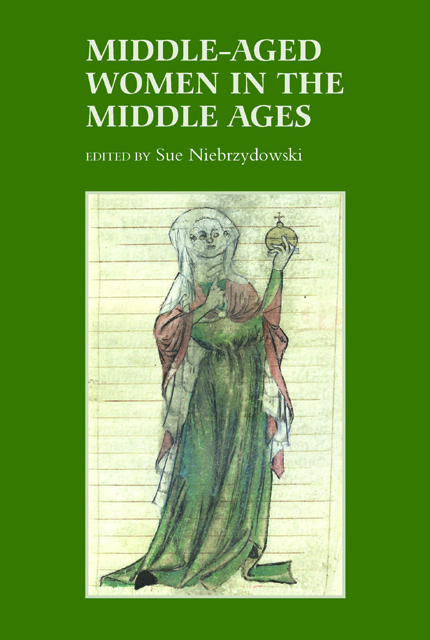Book contents
- Frontmatter
- Contents
- List of Plates
- Abbreviations
- Contributors
- Introduction: ‘Becoming bene-straw’: The Middle-Aged Woman in the Middle Ages
- 1 The Age of Discretion: Women at Forty and Beyond
- 2 Seeking the Middle-Aged Woman in Medieval Wales
- 3 Middle Age in Romance? Magic, Enchantment and Female Power
- 4 Age and Desire in the Old English Life of St Mary of Egypt: A Queerer Time and Place?
- 5 The St Albans Psalter: Sex, Desire and the Middle-Aged Woman
- 6 Speaking Volumes: the Middle-Aged Woman and the Book in Medieval England
- 7 ‘Late hir seye what sche wyl’: Older Women’s Speech and the Book of Margery Kempe
- 8 Preparing for Mature Years: the Case of Margaret of Anjou and her Books
- Select Bibliography
- Index
3 - Middle Age in Romance? Magic, Enchantment and Female Power
Published online by Cambridge University Press: 14 February 2023
- Frontmatter
- Contents
- List of Plates
- Abbreviations
- Contributors
- Introduction: ‘Becoming bene-straw’: The Middle-Aged Woman in the Middle Ages
- 1 The Age of Discretion: Women at Forty and Beyond
- 2 Seeking the Middle-Aged Woman in Medieval Wales
- 3 Middle Age in Romance? Magic, Enchantment and Female Power
- 4 Age and Desire in the Old English Life of St Mary of Egypt: A Queerer Time and Place?
- 5 The St Albans Psalter: Sex, Desire and the Middle-Aged Woman
- 6 Speaking Volumes: the Middle-Aged Woman and the Book in Medieval England
- 7 ‘Late hir seye what sche wyl’: Older Women’s Speech and the Book of Margery Kempe
- 8 Preparing for Mature Years: the Case of Margaret of Anjou and her Books
- Select Bibliography
- Index
Summary
Time is a crucial romance subject: romances frequently span lengthy periods, and the recurrent motifs of exile and return, youth and adulthood, initiation and marriage depend on the passage of time. Romances repeatedly depict the righting by children of wrongs done to their parents, the rediscovery of the rightful heir, or the hero’s proof of himself over time. Romances, as Northrop Frye eloquently puts it, typically ‘exhibit a cyclical movement of descent into a night world and a return to the idyllic world’, a movement reflecting the great natural cycle of life, death and rebirth. Birth and death are resonant romance themes, and the nostalgic emphasis of the medieval imagination, partly rooted in the vicissitudes of medieval life, ensures that reminders of mortality are never far away. Time can be explicitly and powerfully evoked, as in the great passage on the seasons in Sir Gawain and the Green Knight, or Malory’s haunting depiction of the passing of time from Candlemas to May near the end of Morte Darthur; in both works natural and liturgical time are interwoven. The subject of age is inextricably linked to that of time, and the coming of age, in particular, is a dominant structuring motif of romance. Derek Brewer in Symbolic Stories argues that romance narratives are family dramas, in which the young man is separated, voluntarily or involuntarily, from his family, to pass through a liminal stage of testing before establishing his name in adult knighthood. Like epic, romance plays on the opposed stereotypes of youth and age. The young, bold hero in search of adventure is complemented by the old, wise king or adviser who urges prudence: Beowulf and Hrothgar; Perceval and Gornemant; Roland and Charlemagne; Arthur and Merlin. The conventional qualities associated with youth and age can be treated in complex and ambiguous ways: Hrothgar is ineffectual without the young hero who defeats the monster, but Beowulf as aged king endangers his country by taking on the role of hero himself. Roland’s heroic pride in refusing to sound his oliphant also becomes his downfall; Perceval’s naiveté denies him the Grail. Merlin’s aged wisdom and self-knowledge cannot halt the workings of his own desire, or reverse destiny.
- Type
- Chapter
- Information
- Middle-Aged Women in the Middle Ages , pp. 37 - 52Publisher: Boydell & BrewerPrint publication year: 2011



